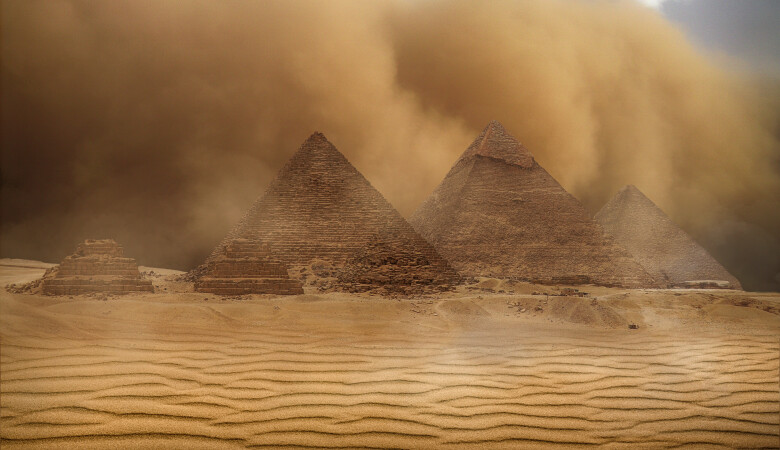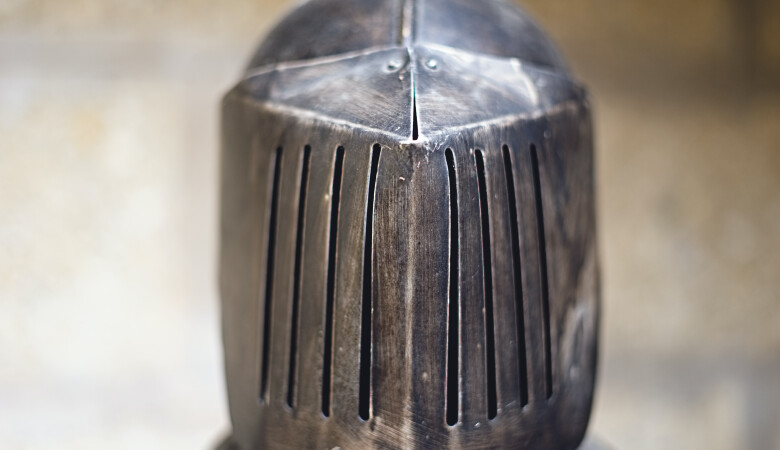Why Does God Put Up with Us? For His Glory and Our Benefit! (Isaiah Sermon 55 of 80)
November 23, 2014 | Andy Davis
Isaiah 48:1-22
Joy, Glory of God
Andy Davis preaches a verse-by-verse expository sermon on Isaiah 48:1-22. The main subject of the sermon is God's mighty work to save His stubborn, sinful people.
- SERMON TRANSCRIPT -
God's commitment to save His people from their sins, and to bring them into His heavenly glory is infinitely great. It is unshakable, it is undimmed by the passage of time, it is undimmed by the greatness of our sins, it's undimmed by the relentlessness, the daily nature of our sinfulness. Nothing in heaven above or the earth beneath or the waters below can ever separate us or sever us from God's commitment to love us in Christ, to save us finally, to save us totally, to save us eternally. Paul put this in the clearest terms at the end of Romans chapter 8 where he says, "I am convinced that neither death nor life, neither angels nor demons, neither the present nor the future, nor any powers, neither height nor depth nor anything else in all creation will be able to separate you from the love of God that is in Christ Jesus our Lord."
God goes beyond even this in Hebrews Chapter 6, when He explains to us the certainty of our final salvation in the language of a covenant oath that He has taken and He cannot break, He will not break. There it says in Hebrews 6:13 when God made His promise to Abraham since there was no one greater for Him to swear by, He swore by himself. Because God wanted to make... It says in Hebrews 6, "Because God wanted to make the unchanging nature of his purpose very clear to the heirs of what was promised, he confirmed it with an oath. 18 God did this so that, by two unchangeable things in which it is impossible for God to lie, we who have fled to take hold of the hope offered to us may be greatly encouraged. 19 We have this hope as an anchor for the soul, firm and secure." So God labors in Scripture to give us sinners an incredible and unshakable assurance of our final salvation in Christ. Now the question that looms before any thoughtful person here is, and we want to say this to God, "Why are you doing all this for me? Why? Why so much grace? Why so much mercy, so much forgiveness?"
Imagine someone who risks everything they hold dear to deliver you from some grave danger. Imagine for example you're being held by some terrorists in a compound in Afghanistan, one of your legs is broken, you have a fever, you're getting weaker by the day. Imagine though one night some elderly Afghan farmer and his wife slip into your room somehow, and pick you up though they can barely carry you and somehow get you past the four men there guarding the compound there and somehow manage to get you on some wooden donkey cart and cover you up with wheat. And imagine as the sun is coming up and the day is dawning, he manages somehow to slip through road blocks set up by the terrorists and begins to carry you to safety, and he's walking at the head of his donkey; and after about an hour, he gets to what he thinks is somewhat of a safe place and pulls you out and gives you some food, gives you some water, and as you look at his face you can see the fear there, but the determination. You know that he's risking everything he holds dear, his life, his family, his home, his reputation in the community, everything he values, to rescue you and carry you hours down the road to safety.
Now the risk to him increases as your escape becomes known in the town that you were rescued from. And as more and more people are sent out in search of you and the danger increases, he somehow manages to talk his way through every challenge and get you finally in the end to safety. Now again you're just thinking, "Why would you do this for me? Why would you risk all of this for me? Why are you willing to put up with so much danger to risk so much to invest so much of everything you value to save my life?" Is it because he loves Americans so much you wonder, is it because he's hoping for a reward, maybe someone once saved his life he's trying to pay back. Maybe he's done some terrible thing in the past, he's trying to atone for his sin by good works. Maybe he hates the terrorists so much he's willing to do anything to thwart them. But at any rate, whatever the reasons you are consumed with this question, "What is your motive? What is your reason for saving me?"
Well that's just a scenario. But all of that is as nothing compared to a similar question we could be asking God the Father concerning our salvation. The scenario is even intensified if you're complaining the whole way criticizing him, wondering when you're going to ever stop to eat, saying that the wheat is a little bit itchy, don't you realize that? And that's what you're like the whole way you're being carried to safety. Friends, that's what we're like the whole way we're being carried to salvation, to eternal life, that's what we're like. And the question we ask here is to Almighty God, why are you doing all this to save someone like me? Infinitely great cost, far greater than that Afghan farmer, far greater than anyone, God the Father sent His only begotten Son who was infinitely precious to Him, became incarnate of the Virgin Mary, lived a sinless life under the law of God. Did signs and wonders and miracles, all of that to end in the cross, pouring out His life blood to save sinners like you and me, delivered over to death it says in Romans 4 for our sins, raised to life for our justification.
And He put up with all of your rebellion before you were converted. He's put up with innumerable offenses and slights, and insults and acts of defiance and fits of selfishness and irritability and complaining and questioning of Him and words of blasphemy, words of unkindness, moments of stunning unbelief toward Him. And you have a long way to go until you're finally done with this journey, until He finally brings you into heaven. His holy heart is grieved by every sin you've ever committed more than you can imagine. Every sin you've ever committed, are committing right now, or will commit in the future and yet He is determined to save you. He's determined to cover all of that by His grace and will never stop working in you and around you and for you until you are finally radiantly glorious in heaven. Why? Why, all of this grace and mercy?
Well, the Bible gives many answers to that question. But there is one reason that stands out above all the others, like Mount Everest in the Himalayan mountain range as the greatest single motivator in all of this. Now, you may think that reason is that He loves you, and that is certainly a great reason. John 3:16, "For God so loved the world that He gave His only begotten Son, that whoever believes in Him should not perish but have eternal life." So certainly, I would call that K2, the second highest mountain in the range.
But Mount Everest is in our text today in Isaiah 48. Isaiah 48 points to the greatest reason of all, the reason why God puts up with all of His people's stubborn defiance, rebellion, the fact that our forehead is like bronze and our necks are like iron. The fact that He puts up with all of that. The reason why, it's in verses 9 through 11. Look at it. You've already heard it read but look at it. " For my own name's sake I delay my wrath; for the sake of my praise I hold it back from you, so as not to cut you off. See, I have refined you, though not as silver; I have tested you in the furnace of affliction. For my own sake, for my own sake, I do this. How can I let myself be defamed? I will not yield my glory to another."
God is putting up with you and me for His own name's sake, for His own glory. That's why. And any other motivation is lesser than that in Scripture, it's more uncertain ground. This is the commitment we have from God. He is committed to His own glory and therefore He will never let you go until you're finally saved. And that's really encouraging, isn't it? That's really, really encouraging. The reason why God has not cut us off in His wrath but instead has poured out His wrath on Jesus, the reason why God has put up with all of our smoldering obnoxious sins, the reason why God is so wisely gracious and patient with us even now, after all of this time, the reason for all of this is for His own name's sake, that He may be maximally glorified in you and me. That's why. God's commitment to save you and me is a subset of His commitment to glorify Himself, to put Himself radiantly on display, to allow the radiance of His love and His wisdom and power and kindness and justice and patience and grace, grace shine forth from the cross of Christ and the empty tomb and from the glories of the new heaven and the new earth. Alright, so that's all intro.
The Context of Isaiah 48
Now we need to get into Isaiah 48 and look at it carefully. And in order to do that, let's understand the context. Isaiah was a Jewish man, a prophet who lived about 700 years before Jesus was born. Prophets were special people. They heard from God by the sovereign Spirit. God communicated things that they couldn't know any other way. And part of that was the ability the prophet had to see the future. Isaiah was living in a time before the Babylonian exile, 100 plus years before God would judge Judah and Jerusalem, by bringing Nebuchadnezzar, the King of Babylon, who would invade in 586 BC, about 120 plus years later, would invade and destroy Jerusalem, destroy the walls, burn every building, and raze the temple and destroy it completely, and leave just a very small remnant of Jews. Who would then be sent away into exile into Babylon. But then in his prophetic eye, Isaiah looks beyond that to a time when he would raise up a man mentioned in Isaiah 48, though, not by name, Cyrus the Great who would come back and invade. He would come and invade Babylon and destroy Babylon. Babylon would be destroyed and the people of God would be told, right in Isaiah 48, leave Babylon now, and they would go back to the promised land and they would resume their history, their heritage there and rebuild Jerusalem and start their Jewish life again.
He's seeing all of this in the future, and as he looks out over what's about to come, God, through the prophet Isaiah, laments their wickedness and their stubbornness. The sins that would lead to the Babylonian destruction. The invasion by Babylon hadn't happened yet. Manasseh hadn't been born yet. Probably or maybe was born, but he wasn't king yet. His great wickedness and idolatry hadn't happened yet. And He's saying, "I know how wicked you are, I know how stubborn you are, I know how your forehead is like bronze," and all that. And He says at the end of this chapter, "If only you had followed my ways, if only you had kept my commands, then none of this needed to have happened, but you don't, you're so stubborn." And not only that, I will refine you in a furnace of affliction though not as silver. We'll talk about that in a minute. When I bring you back, you're going to be mostly the same people that you were. Your change of address from Babylon to Jerusalem, won't change your heart, and so he ends the chapter with this statement: There is no peace says my God for the wicked. So, He's warning His people concerning their own sins, and yet in the midst of all that, He tells them of His determination not to cut them off. He will bear with them, and He will be patient with them. That's what's going on in this chapter.
I. The Sovereign God Predicts and Works History to Win His Stubborn People (vs. 1-8)
Now, let's look at it carefully section by section. First verses 1 through 8, The Sovereign God predicts and works history to win His stubborn people, So He begins by calling to them. "Listen, O hypocritical Israel." Verse one and two: "Listen to this O house of Jacob, you who were called by the name of Israel, you who come from the line of Judah, you who take oaths in the name of the Lord and you who invoke the God of Israel, but not in truth or righteousness." So they're hypocritical, they claim to be Jews, they're biologically descended from Abraham, but they're not living the life, they're not righteous, they're not holy, they're ungodly, they're hypocritical. They call themselves citizens of the holy city, and they rely on the God of Israel, the Lord Almighty is His name, they're very stubborn. Look what He says in verse 4, "I know how stubborn you were. The sinews of your neck were iron and your forehead was bronze." In other words, they just don't get it, you get... Just tell them the same thing, over and over and their foreheads bronze, they're hard-headed. And they're stiff-necked. We hear that about the Jews a lot, in the Old Testament. It means they just won't yield to the king, they won't take their stubborn defiant chins and drop them down in submission to the king, and so they're not yielded, they're rebellious.
Verse 8. He says, You've neither heard nor understood. From of old, your ear has not been open. Well do I know how treacherous you are. You are called a rebel from birth." So that's what he's talking to these Jewish people who just consistently in every generation will not listen to God speaking through the prophets. Now he says, I have had a strategy in communicating with you. I have predicted the future. Look at Verse 3, he says, "I foretold the former things a long ago, my mouth announced them and I made them known, then suddenly I acted and they came to pass." We've been saying this, God alone can do this, He's the only one that can do this, He's the only one that can predict the future. Not only has He done it a little, He's done it a lot. He did it through Noah, predicting the flood and the flood came, He did it through Abraham, predicting what would happen with his descendants, how they'd be in a... They'd be strangers in a country not their own, they'd be enslaved and mistreated 400 years. He's very clear predicting the future and it happened, and then after that I'll punish that nation, the Egyptians, and bring you back to this place.
All of that happened, He in the past has consistently predicted the future, predicted many things through Moses, even this Book of Isaiah, how many prophecies has Isaiah given us? Oracles about the nations, the rise and fall of various things. He's predicted what happened with the Assyrians, all of these things predicted. And what He says is, Look, I'm the only one that can do this. God alone can predict the future. I predicted it, then suddenly I acted and they came to pass. So this is a sovereign God, a God who's not sitting back idly and watching history like He's watching a movie. He's the one that has orchestrated these things, He's the one that's acting in bringing it to pass. Why does He do all that? His reason's given in 4-8, "I foretold the former things long ago, my mouth announced them and made them known, then suddenly I acted and brought them to pass," verse 4, "For I knew how stubborn you were. The sinews of your neck were iron, your forehead was bronze, and therefore I told you these things long ago. Before they happen, I announce them to you so that you could not say, 'My idols did them, my wooden image and metal god ordained them.'"
So they just are stubborn, they're hard-hearted, hard-eared, they can't hear. They refuse to listen to God, so God puts His predictions on record. Writes them down, puts it on record, and then they come to pass. And his reason is you can't tell me your idols did this, they didn't. Your wooden image and your metal god did not do this, I did it.
So He calls on them to listen and He asks them to acknowledge His greatness and to repent. "You have heard these things, look at them all." Verse 6. "Will you not admit them? From now on, I will tell you of new things, of hidden things unknown to you. They're created now, not long ago. You've not heard of them before today, so you cannot say, Yes, I knew of them. You have neither heard nor understood, from of old, your ear has not been opened. Well do I know how treacherous you are. You are called a rebel from birth." So God is saying here, "I'm going to start telling you some new things you've never heard before. Some new predictions are about to come our way."
Now, let me tell you where we're at in this book. Isaiah 40 to 48 is a section that has had it as a dominant theme Idolatry, exile, destruction of Babylon, restoration, a dominant theme. But we're about to turn a corner and in Isaiah 49 through 55, the dominant theme is the suffering servant. We're about to get introduced to an individual, the servant of the Lord, who is going to suffer for the sins of His people, And the vision for this salvation is beyond Israel. That's too small a thing, it's going to be even through to the Gentiles, even to the distant nations of the earth. And He's going to be despised and rejected, He's going to offer His back, Isaiah 50, to those who beat Him, and His beard to those who pluck it out. And Isaiah 52, His blood is going to sprinkle the nations and kings are going to hear about Him. Isaiah 53, All we like sheep have gone astray, each of us has turned to his own way. That's all coming. Isaiah 55, the invitation: Come all you who are hungry. Come buy and eat. You who have no money, buy. Without money, without cost. Buy salvation for free. That's where we're going.
He ways I'm about to tell you some things you've never heard before, some new things, things that are going to be very hard for you to conceive, oh Israel, oh hard-headed, hard-hearted Israel. That God will send His Messiah and He will suffer and die. And you're going to stumble over that. But I'm going to tell you ahead of time before it even happens. That's what He's saying in these verses and that's where we're going. So verses 9-11, this patient God refines His people for His own glory and for our benefit. So, verse 9, God puts up with His people for His own sake. Verse 9, "For my own name's sake, I delay my wrath. For the sake of my praise, I hold it back from you so as not to cut you off." This is the main idea of this sermon, the main idea of this chapter, of this book, of the Bible, of the universe. God does everything for His own glory above everything else. That's the main idea. We have to go merely beyond God's delight in His own glory. God delighted in His glory before He said, "Let there be light," He was very happy as God.
Don't ever imagine God created because He was lonely and had nothing to do. Father, Son and Spirit in perfect fellowship with one another, perfectly happy with one another, wanted to share that happiness with some created beings who could understand it. And so He created us in His image, but we rebelled and we went into wickedness and sin and idolatry. Now He's redeeming us so that we can enjoy His glory along with Him, that we could be happy in Him. And so that's what it means, "For my own name's sake," it means for God's reputation's sake, for the sake of His honor, for the sake of His esteem in the world. That's why He's doing this. Like it says in the Lord's prayer, "Our Father in Heaven, may your name be hallowed. May your name be held in honor by the peoples of the earth." That's why God does everything. That was Jesus' first priority in prayer. "May your name be hallowed oh God. May people on earth revere you, may they honor you, may they love you, and cherish you, and delight in you, and fear you, and may they serve you."
So, God delayed His wrath from Israel for His own name's sake, for the sake of His praise. He was astonishingly patient with Israel over centuries of rebellion. Very patient with them. He's very slow to anger. Why? So that God's patience might be put on display. But more than that, God had in His mind before the creation of the world, a better way to display His wrath and His justice in reference to His chosen people, a better way. He could've just wiped them off the face of the earth. They deserved it. So do we. So do we. But for the sake of His glory, He delayed His wrath to not cut them off and wipe them out and make them extinct. He did it so He could display His wrath and justice at the cross of Jesus Christ. That's better. It was a better plan. And so, He delays His wrath so He can pour it out on His Son, His only Son in our place. It was better for God to do it that way.
And so it says in Romans 3:25-26, "God presented Him, [Jesus] as a sacrifice of atonement [as a propitiation, a blood sacrifice that turns away wrath, a propitiation] through faith in His blood. He did this to demonstrate His justice because in His forbearance, [that means His long patience] he had left the sins committed beforehand unpunished." That links with what we get here in Isaiah 48, God delayed His wrath so He could punish Israel at the cross. Isn't that awesome? And pour out His justice and His wrath on His own son Jesus as our substitute. And concerning His own people, He had a better plan for them too. Instead of killing them like they deserve, instead of wiping them out like they deserve, He decided to redeem them and refine them. Praise God. And that's what He's doing with you and me in Jesus, isn't it? Instead of cutting us off,
God Refines His People for their Benefit
He's decided to redeem us, that means buy us back through the blood of Jesus, and refine us, purify us. Look at Verse 9 and 10, "For my own name's sake, I delay my wrath. For the sake of my praise I hold it back from you so as not to cut you off." Verse 10, "Behold, I have refined you though not as silver. I have tested you in the furnace of affliction."
So instead of wiping them out as they deserve, God would redeem them and refine them, He delayed His wrath, He deported a small number of them in exile to Babylon, He allowed them to flourish there and to repopulate and grow. And then brought 42,000 of them back under Ezra and Nehemiah, back to rebuild Jerusalem. That's what He's going to do. He says, I'm going to put you in the smelter's fire, the refiner's fire like a silversmith would do with silver ore. And I'm going to put the heat on you and the heat's going to cause those impurities to bubble to the surface. I'm going to refine you though not as silver. What does He mean by that? Well, a good silversmith isn't going to stop until all of the impurities are gone. If you look at Psalm, don't do it now, but Psalm 12:6 talks about the Bible, I love this verse. Talks about the Bible, the perfection of the Bible. And it says, Psalm 12:6, "The words of the Lord are flawless like silver refined in a furnace of clay purified seven times over." So that's what the refiner is going to do.
He said, "I didn't do that with you because you know what would happen? You'd all be dead." And do you think those 42,000 Jews who came back under Ezra and Nehemiah were perfect people? Just holy and perfect people. They've been through it, now, the furnace of affliction, now they're holy and perfect. Not at all. You remember the story about how they started to settle in and intermarry again and start going after other gods again, you remember that? You remember how Ezra reacted? He took his hands in his hair and like, ugh! How could you do this! After all that we've been through. Pulling out his own hair. Now you know, Nehemiah is a different man. He pulled their hair out. So... Some of you are the I'll pull my own hair out, and others are like, "I'm going after those guys and I'm pulling their hair out until they make this thing right." Either way it was a hair-pulling moment. Why? Because they've not been perfectly refined, the Babylonian exile didn't make the Jews a perfect nation.
God’s Ultimate Purpose in Their Salvation: His Own Glory
But God's purpose in all of this, verse 11, is clear. "For my own sake, for my own sake, I do this. How can I let myself be defamed? I will not yield My glory to another." God says it in repetition. I'm doing this, I'm patient, for my own sake, for my own sake, that's His priority structure. He ultimately does it for our eternal joy, that's second. So that we can rejoice in Him and know Him and live forever. Now, if He failed to refine Israel or if He overlooked their wickedness and acted like it didn't matter to Him or if He wiped them out entirely from the face of the earth because of their wickedness, in all of the other cases, God would be defamed. It would be said He couldn't save His people. Or He didn't care about holiness. He says, "I will not yield my glory to... " You know what He's doing, He's saving a remnant from every tribe, and language, and people, and nation, a remnant chosen by grace, He's saving them, in such a way that when they get to heaven, they will know all of the glory they see and that they are displaying themselves is from God.
He's not yielding His glory to you, He will not allow you to take any credit whatsoever for your own salvation. He's not going to yield His glory to anyone else. He will save you in such a way that you will say to God alone be the glory that I'm here in the New Jerusalem, now. And that's awesome, isn't it? Now, just an aside, but an important one. God says in this verse He will not share or yield His glory with another, meaning someone other than me. But He will share it with Jesus. He will share it with Jesus and is sharing it right now with Jesus. You remember in John 17:5, Jesus in His incarnation, He prays and He says, "And now, Father, glorify me with the glory that I had with you before the world began." Clear evidence of the deity of Christ.
III. The Eternal God Will Bring Cyrus to Achieve His Purpose (vs. 12-16)
Now, in verses 12-16, the eternal God will bring Cyrus to achieve His purpose. God is the I Am, the eternal, the Creator, the Ruler. Verse 12,13, "Listen to me, O Jacob, Israel, whom I have called, I am He. I am the first and I am the last. My own hand laid the foundations of the Earth and my right hand spread out the Heavens. When I summon them, they all stand up together." This is the second time that God has called Himself the first and the last, He was there at the beginning of history. He'll be there at the end and every day in between. He's orchestrating history for His own purposes.
By the way. Jesus says the same thing about Himself to the Apostle John on the island of Patmos, in the Book of Revelation. Revelation 1:17-18, "Then he placed his right hand on me and said, 'Do not be afraid. I am the first and I am the last. I am the living one. I was dead and behold I am alive and I live forever and I hold the keys of death and Hades.'" So Jesus is claiming to be God there, there's no doubt about it. God's own right hand laid the foundation of the universe, there is nothing He cannot do. He rules actively over the stars of the cosmos, when He gives the word they all stand up together, He says, that when He summons the stars, they do what He says. This teaches again the doctrine of God's active, direct government of the universe. There's not an instant in which the universe, even the distant stars, don't do what He commands.
God alone foretold Cyrus, and He will bring him to succeed, verses 14-16. He's been very plain about what's going to happen to end the Babylonian exile. He made it plain over a century before it happened, He would summon Cyrus to be His chosen ally, He says in these verses. A co-worker for His glory, to destroy the Babylonians, He's going to summon Cyrus and make certain that he succeeds as we've seen. Furthermore, God says, "I didn't do this off in a corner, I didn't speak somewhere in a land of secret. I did it to make it obvious to everyone. I told everyone what I was going to do."
IV. The Loving God Will Send Another to Redeem His People (vs. 16-22)
Now in verses 16 through 22, the loving God will send another to redeem His people. In Verse 16 a mysterious sent one, anointed with the Spirit, speaks to us. Some mysterious little verse in the middle of nowhere, "And now the sovereign Lord has sent me with His Spirit."
Who is this person speaking to us? Well, an easy answer is this Isaiah the prophet. But Isaiah doesn't talk about himself that way, he doesn't call himself anointed with the Spirit, or covered with the Spirit, that's not something he does. This is the language of the Messiah. So suddenly Jesus comes in, and there's no doubt that He's the one referred to in the very next chapter. Now, these chapters are helpful. You know these numbers 48-49 and all, that's helpful, but sometimes the divisions can throw us off. We're going right from this right into the suffering servant passage within a few words. And I think he makes a little bit of an appearance here and now the sovereign Lord has sent me with His Spirit. That's a Trinity verse, the Father sent me the Son with the Spirit to minister, to redeem. We'll get to that, God willing, next time.
In verses 17 through 19, If only God's people had obeyed His Word, "This is what the Lord says, Your Redeemer, the Holy One of Israel, 'I am the Lord your God, who teaches you what is best for you, who directs you in the way you should go. If only you had paid attention to my commands, your peace would have been like a river, your righteousness like the waves of the sea, your descendants would have been like the sand, your children like its numberless grains. Their name would never be cut off nor destroyed from before me.'" Well, this is coming right from the heart of God, God stands over our messy sinful, broken, rebellious lives and says, these words. If only you had done it my way, none of this would be happening. If only you had listened to my word. My word is a lamp to your feet, my word is a light to your path. Psalm 19 says, "The law of the Lord is perfect, restoring the soul. The statutes of the Lord are trustworthy, making wise the simple. The precepts of the Lord are right, giving joy to the heart, the commandments of the Lord are radiant, giving light to the eyes. The fear of the Lord is pure, enduring forever, the ordinances of the Lord are sure and altogether righteous. They are more precious than gold, than much pure gold. They're sweeter than honey, than honey from the comb. By them is your servant warned. In keeping them there is great reward."
So this is before the exile even happened. If only you'd obeyed me, there wouldn't have been an exile, He laments. And you see the grief in His heart. Do you have a sense of that? If only, Oh, that you had done this. I get the picture of Jesus weeping over Jerusalem and saying, "Oh Jerusalem, Jerusalem!" Tears coming down His face. "How often I've longed to gather your children together as a hen gathers her chicks under her wings, but you were unwilling. Behold, your house is left you desolate." How miserable are our lives when we don't obey God's word. Thank God He sent someone who did, Amen. Who took God's law perfectly seriously and obeyed it perfectly, and won for us a righteousness that He just gives us as a gift. Thank God for Jesus because these words sum up Jesus' life, He heeded God's law and obey it and fulfilled it. And so He is the redeemer and He leads His people to flee Babylon.
He says, "Leave Babylon, flee from the Babylonians. Announce this with shouts of joy and proclaim it. Send it out to the ends of the earth, say, 'The Lord has redeemed his servant Jacob.' They did not thirst when he led them through the deserts, He made water flow from them. From the rock, He split the rock and water gushed out. 'There is no peace,' says the Lord, 'For the wicked.'" So, He's predicted the fall of Babylon, it's coming, Bel is destroyed in Chapter 46, Babylon falls in Chapter 47, now He tells His people to leave Babylon and go home. Leave Babylon now and rejoice that Babylon is falling. And you're going to get ushered back, you're going to get protected on your journey home, but then the final word as I've said, Verse 22, "There is no peace…for the wicked." If you go back Oh Jews and you start doing those same things again, judgment will come.
V. Applications
Alright, so that's the chapter. What applications? Well first, just plead with God to change your heart and rearrange your priority structure so it becomes like His. Say, "God, would you please change my heart so that I esteem your glory above everything else in my life? Just change me, O Lord. Change me. Help me to understand. Help me to understand your glory. Change my priority structure. Help me to love your glory and live for your glory and delight in your glory above everything else."
And as part of that, I'm just am pleading with any of you that are here on the outside looking in, you know you're not redeemed. We sang a song earlier today. How can I know that I've been forgiven? How can I know that I'm going to go to heaven? Maybe you're asking that. You don't know that you've been redeemed, you don't know that you're going to heaven when you die. God brought you here today, I believe, to hear this Gospel. You've heard enough this morning to know how to be saved. God sent His Son to die for sinners like you. Trust in Him, flee to Him, look to Him, let Him save you. He will never let you go until at last you're in heaven. Flee to Christ.
Thirdly, if I can just urge you folks, this is the last time Babylon will be openly mentioned in Isaiah, in the book of Isaiah, although it's referred to in other places. We're told here to leave Babylon, okay? And it says in other places to other places, so they we'll not share in her plagues and her judgments. So again, I warn you to flee the worldliness that is summed up by Babylon, flee worldliness, flee the corruptions of this life. "Come out from her and be separate," says the Lord, "So you won't share in her plagues." It says in James 4:4, "You adulterous people. Don't you know that friendship with the world is hatred toward God. Anyone who chooses to be a friend of the world becomes an enemy of God." So don't live for the merchandise, and the pleasures, and the food, and the drink, and the fun, and the hobbies, and the money, and the power. Don't live for those things. Thank God for them, the things that God gives you, but don't live with them.
Fourthly, ask God to soften your head and your heart, okay. [chuckle] It's like, "Well, I thank God that I don't have a bronze forehead. I thank God that I don't have a stiff neck. I'm so yielded to God and I understand immediately all the things He says to me." Is that really true of you? Are you really wanting to say that to God? "Thank you Lord, that I don't have a forehead of bronze and a neck of iron." Oh, don't say that dear friends. Say, "God, I have a forehead of bronze and I have a neck of iron. I've been proving it for years. Would you please soften? Soften me? Soften my heart? Help me to yield to your word."
And focus, just take a minute and look again at Verse 17 and 18. "This is what the Lord says, your Redeemer, the Holy One of Israel, I am the Lord your God who teaches you what is best for you, who directs you in the way you should go. If only you had paid attention to my commands." Do you not hear that oh Christians? Don't you hear God saying something to you that? Are you in the Word every day? Seriously, are you, do you get up every day and open up the Scripture and listen to God? He's saying, "If only you'd listened to me then you wouldn't be having the troubles you're having right now. If only you obeyed my commands you wouldn't be having the afflictions you're experiencing. You wouldn't have had to go through all this." So much misery in our lives comes from not listening to God's word. And then realize how patiently God is putting up with your sins and mine, Amen. Don't you sense it?
Remember how I talked about a bruised reed, He will not break, a smoldering wick, He'll not snuff out. Do you know how much smolder you're putting out every day? It's bad [chuckle] And we're just smoke in God's eyes, but He is so patient with us. Thank God for His patience with you. Confess your sins regularly to Him and thank Him saying, "Thank you for being patient with me." And finally, just looked forward to the day. He says, "I'm not going to share my glory with another, but I'm going to save you in such a way that you will be just swimming in a sea of my glory." Isn't that wonderful? We're looking ahead to the New Jerusalem that's going to come down radiantly bright shiny, you're going to be in a new Jerusalem, a new heaven, a new earth, and you yourself are going to shine like the sun in the kingdom of your Father. If you're a Christian, you're going to shine radiantly. And the light you'll see in that place, it will all be the glory of God through Christ. Every ray of light you'll see in the new heaven, the new earth will be God's glory. And then you'll realize, I was saved in such a way that He was glorified and I humbled, to God be the glory alone. Close with me in prayer.































